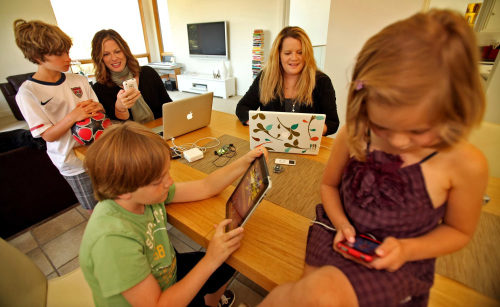WASHINGTON (AP) -- A European study concludes a few years of cellphone use did not raise children's risks of brain cancer.
Repeated studies in adults have been reassuring, too, although an arm of the World Health Organization said this spring that there is a possibility cellphones pose a risk.
 |
Moms are photographed at Hall's Calabasas, California home, where they run a business designing "apps" for mobile devices focusing on apps for kids. (MCT) |
Wednesday's report marks a first step in examining the question in children, whose brains still are developing.
Swiss scientists tracked 352 children ages 7 to 19 who were diagnosed with brain cancer between 2004 and 2008 in Norway, Denmark, Sweden and Switzerland. They interviewed the kids about their prior cellphone use, and compared them with 646 healthy children and teens.
About half of both groups said they were regular cellphone users, researchers reported in the Journal of the National Cancer Institute. Children who said they started to use cellphones at least five years earlier were not at higher risk of cancer than those who said they never had used them regularly. Duration or number of calls, or which side of the head the phone was held, also did not make a statistically significant difference.
However, the researchers could check phone-company records for a subset of the kids. The few dozen who had had cellphone service the longest, about three years or more, did have an increased risk.
The researchers at the Swiss Tropical and Public Health Institute noted that childhood brain cancer has not increased since cellphones appeared.
They encouraged more research, however, saying their study was not large enough to rule out a small risk and that kids' cellphone use has increased since 2008.
Another question is longer-term use, although many children text more than talk.
``This is a very important study,'' said Elizabeth Ward of the American Cancer Society, but one that will be debated. ``It is important that additional studies be done in children, adolescents and young adults with early life exposure to mobile phones.''
The cancer society says people who are concerned about a possible risk can keep the phone away from their heads and limit children's use.
Moms Jennifer Noonan, background center left, and Cara Hall, center right, are photographed at Hall's Calabasas, California home, June 15, 2010, where they run a business designing "apps" for mobile devices focusing on apps for kids, and they're a good representation of how non-programmers are trying to get in on the bottom floor of the 'app' craze. With them are their children Liam Noonan, 11, left, and Hall's children Ethan Gold, 8, foreground center, and sister Harper Gold, 5. (Al Seib/Los Angeles Times/MCT)
<한글 요약>
어린이 휴대폰 사용, 암 발병률과 무관하다
유럽의 새로운 연구 결과, 어린이의 휴대폰 사용이 뇌 관련 질환에 걸릴 위험성과 큰 상관이 없는 것으로 밝혀졌다.
올해 5월 세계보건기구(WHO)에서 휴대전화 전자파를 발암물질로 분류했지만 성인을 대상으로 해도 휴대폰 사용과 발암 가능성의 상관관계는 약한 것으로 나타났다.
스위스 열대기후와 공공건강 협회는 어린이의 휴대폰 사용이 인체에 어떤 영향을 미치는지 조사하기 위해 2004년부터 2008년까지 뇌종양을 앓은 경험이 있는 7~19세 어린이 352명을 대상으로 의료 통계를 분석했다.
연구진은 이 어린이들의 휴대폰 사용 습관에 대해 조사 한 뒤 뇌종양을 앓은 적이 없는 646명의 어린이 및 청소년과 비교하는 방식으로 연구를 진행했다.
국립암협회 저널에 실린 이 연구 결과에 따르면 두 그룹에서 각각 절반 이상이 일상적으로 휴대폰을 사용한다고 했으며 최소한 휴대폰 사용을 5년 정도 먼저 한 어린이들과 휴대폰을 한번도 일상적으로 사용한적이 없다고 한 어린이들 간에 뇌종양 발병 확률이 다르지 않은 것으로 드러났다.
통화 횟수, 시간 그리고 어느 쪽으로 전화를 받는지 다양한 조건들이 모두 통계적으로 큰 차이를 드러내지 않았다.
또한, 연구진은 휴대폰 사용이 시작된 이래 유아기의 뇌종양이 증가한 적이 없다는 점에 주목해야 한다고 밝혔다.
하지만 연구팀은 휴대폰 사용을 일찍 시작한 어린이, 청소년, 어른에 대해 좀 더 섬세한 후속 조사 및 의학적 연구가 필요하다고 덧붙였다.






![[Herald Interview] 'Korea, don't repeat Hong Kong's mistakes on foreign caregivers'](http://res.heraldm.com/phpwas/restmb_idxmake.php?idx=644&simg=/content/image/2024/11/13/20241113050481_0.jpg)

![[KH Explains] Why Yoon golfing is so controversial](http://res.heraldm.com/phpwas/restmb_idxmake.php?idx=644&simg=/content/image/2024/11/13/20241113050608_0.jpg)